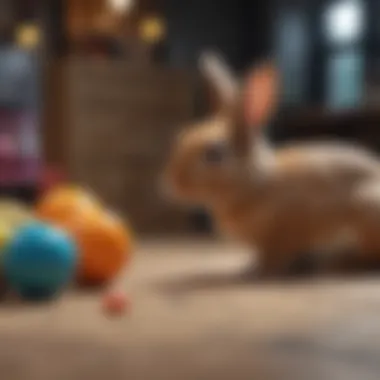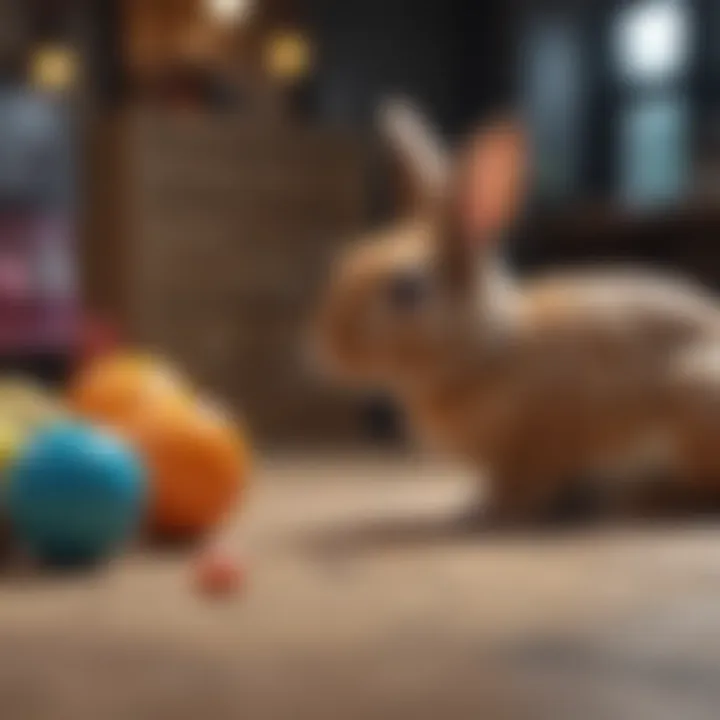Exploring Play: What Bunnies Enjoy Engaging With


Intro
Understanding the playful nature of rabbits enhances their care and contributes significantly to their wellbeing. Bunnies are not just cute pets; they are intelligent creatures with specific needs and preferences when it comes to play. This section will explore these elements, laying the groundwork for recognizing how important play is for rabbits.
Many owners underestimate the mental and physical stimulation bunnies require to thrive. Engaging with them in play not only nurtures their instincts but strengthens the bond between a pet and its owner. This article will present various toys, activities, and tips to create an enriching play environment for bunnies.
Understanding Your Pet
Pet Behavior Basics
Rabbits are naturally curious animals. They explore their environment using their sense of smell and touch. Understanding basic pet behavior will help owners recognize signs of happiness or distress during play.
- Happiness Indicators: Binkying, where a bunny jumps and twists in the air, is a clear sign of excitement. Flopping over on their side indicates they feel safe and relaxed.
- Stress Signs: Thumping or hiding may indicate fear or discomfort.
Awareness of these behaviors is crucial as it guides owners in determining the best activities for their rabbits.
Common Breed Characteristics
Different breeds exhibit distinctive characteristics that influence play behavior. For example, Holland Lops may enjoy gentle interaction, while Rex breeds may prefer more energetic play. Understanding these nuances helps in selecting suitable games and toys.
Species-Specific Needs
Every bunny is unique, but they all share a few basic species-specific needs when it comes to play.
- Social Interaction: Bunnies are social animals and often enjoy the company of their human companions or fellow rabbits.
- Physical Space: Adequate space is essential for free movement and exploratory play.
- Variety of Toys: Provide a mix of toys to keep their environment stimulating and encouraging natural behaviors like chewing and digging.
Exploring this knowledge assists owners in enhancing their bunnies’ playtime experiences.
Enrichment and Activities
Indoor vs.
Outdoor Activities
Both indoor and outdoor activities play an important role in a bunny’s life. Indoor play can be more controlled, while outdoor interactions offer fresh air and new environments.
- Indoor Activities: Create obstacle courses or use tunnels for exploration.
- Outdoor Activities: Supervised outdoor time allows your bunny to nibble on grass, which can be enjoyable and healthier for them.
Interactive Toys and Games
Toys should engage the rabbit's mind and body. Consider these options:
- Chew Toys: Natural wood or safe rabbit toys satisfying their chewing instinct.
- Puzzle Toys: These encourage problem-solving and can be filled with treats to motivate interaction.
- Tunnels and Hides: Safe spaces to play and explore promote confidence and safety.
Engaging toys can lead to hours of enjoyment and helps prevent boredom.
Socialization Opportunities
Rabbits also benefit from social interactions. Playdates with other rabbits can be a positive way to introduce new friends. Owners should observe interactions and ensure they are safe and positive.
Social play is crucial for rabbits' emotional health.
Creating an environment rich in varied play options is essential for any bunny owner's success. By focusing on these aspects, owners can ensure that their rabbits lead happy and fulfilling lives.


Intro to Bunny Play
Understanding how bunnies engage in play is essential for any pet owner seeking to improve their companion's quality of life. Play is not merely a fun pastime; it is a vital aspect of a bunny's physical and mental well-being. Engaging in play promotes healthy behaviors and aids in stress relief. It allows bunnies to express their natural instincts and behaviors, which can include hopping, chewing, and exploring their surroundings.
When bunnies play, they can develop their social skills. This interaction becomes particularly apparent when there are multiple bunnies. Observing how they communicate and engage with one another highlights the importance of socialization in their play. Furthermore, play helps to build a more robust bond between the bunny and its owner. Just like humans, bunnies thrive on connections, and shared playful experiences can strengthen this bond.
Why focus on bunny play?
Pet owners often underestimate the need for a stimulating environment for their pets. A thoughtful approach to play not only keeps bunnies entertained but also enriches their lives. Recognizing the different ways bunnies play, such as with toys or through activities, opens a path to better care.
Here are several relevant points to consider about bunny play:
- Mental stimulation: Engaging toys and activities prevent boredom and promote healthy rabbit behaviors.
- Physical health benefits: Regular playtime exercises their muscles while reducing the risk of obesity and other health issues.
- Behavior management: Understanding play can help prevent undesirable behaviors stemming from boredom or lack of stimulation.
As we delve into the complexities of bunny play, keep in mind that it is an ongoing exploration of preferences, needs, and the delightful world of these furry companions. The subsequent sections will provide deeper insight into what bunnies enjoy and how best to facilitate their playful experiences.
Understanding Bunny Behavior
Understanding bunny behavior is critical for creating an optimal play environment for these animals. Bunnies express their personalities and needs through various behaviors, which can often inform us about their preferences for play. Their behavior is inherently tied to their instincts. Recognizing these instincts allows owners to foster a safe and enjoyable atmosphere. This understanding also contributes to the overall relationship between pet owners and their bunnies, enabling a stronger bond.
Natural Instincts and Play
Bunnies are prey animals, which means their natural instincts play a significant role in their engagement during play. They love to dig, chew, and explore, which is reflective of behaviors seen in the wild. In nature, bunnies will spend a lot of time foraging for food and finding safe places to hide from predators. Thus, incorporating elements that mimic these activities is vital. Chewing is not just a pastime; it helps maintain their dental health. Providing appropriate chew toys made from safe materials is essential. Additionally, offering materials for digging can satisfy their instinct to burrow, which is a natural behavior in wild rabbits.
When considering toys, it’s important to factor in the preferences of the specific bunny. Some might enjoy toys that roll, while others prefer something they can dig into. By observing how a bunny interacts with different toys, owners can better understand what resonates with their individual pet’s instincts.
The Importance of Social Interaction
Bunnies are social creatures by nature. In their wild state, they live in groups and establish a hierarchy. This social structure is crucial for their mental well-being. Therefore, when considering play, the social aspect cannot be neglected. Interaction with other bunnies or humans enriches their play experience.
Engaging in play together can alleviate issues like boredom and stress. Bunnies that are isolated may exhibit signs of anxiety or depression. This makes understanding the importance of social interaction crucial for any bunny owner. Arranging playdates with other bunnies can provide valuable stimulation and encourage physical activity.
It is essential to facilitate both independent and social play. A balanced approach allows bunnies to develop their instincts while forming healthy social bonds.
Owners should consider incorporating activities that involve interaction, such as chase games or guided exploration. Providing an environment where bunnies feel safe to express their social behaviors is equally important. By acknowledging the significance of social interaction, owners can create a fulfilling life for their pets.
Types of Toys for Bunnies
Toys play a critical role in enriching the lives of bunnies. They provide mental stimulation and promote exploration. Toys help to channel a bunny's natural instincts and behaviors in a safe way. This section delves into various types of toys suitable for bunnies, focusing on their specific benefits and considerations for pet owners. Understanding the right toys is essential to ensure a fulfilling play experience for these animals.
Chew Toys and Their Benefits
Chew toys are fundamental for bunnies, primarily because their teeth grow continuously. If bunnies do not chew on suitable items, their teeth can become overgrown, leading to health issues. Chew toys help wear down the teeth effectively, promoting dental health.
These toys come in various forms, including:
- Wooden blocks: Untreated hardwood is great for chewing and can keep rabbits entertained.
- Hay-based toys: Items made from compressed hay provide both chewing satisfaction and nutritional benefits.
- Cardboard: Simple cardboard shapes or tubes can serve as inexpensive chew toys.
When selecting chew toys, avoid those treated with chemicals or harmful substances. Always supervise your bunny while they chew to prevent choking hazards.
Interactive and Puzzle Toys
Interactive and puzzle toys are designed to engage a bunny's mind. They stimulate problem-solving skills and promote physical activity. Such toys often require bunnies to navigate or manipulate them to reach treats or hidden rewards. This form of play mimics natural behaviors, allowing bunnies to feel accomplished as they interact with their toys.
Examples include:
- Treat dispensers: Toys that dispense treats when rolled or nudged challenge bunnies mentally and physically.
- Hide-and-seek toys: These toys often come with compartments to hide snacks, encouraging bunnies to forage and explore.
- Maze-style toys: These structures can engage bunnies for extended periods, enhancing their sense of adventure.


These types of toys contribute significantly to a bunny's overall wellness, reducing boredom and preventing stress-related behaviors.
DIY Bunny Toys
Creating DIY bunny toys can be both fulfilling and economical. It is a wonderful way to recycle household items while catering to a bunny’s play needs. Many bunnies appreciate the texture and novelty of homemade toys.
Ideas for DIY toys include:
- Paper towel rolls: Fill these with hay or treats for a simple foraging toy.
- Socks filled with hay: An old, clean sock stuffed with hay can serve as a chew toy.
- Fruit tree branches: Branches from untreated fruit trees like apple and pear can provide safe chewing opportunities.
When making toys, ensure all items are bunny-safe. Avoid toys with small parts that could be swallowed or with toxic materials. Always check the items beforehand to ensure there are no hazards.
With the right toys, bunnies can exhibit healthier behaviors and enjoy their playtime more.
Playful Activities and Games
Play is essential for bunnies as it fosters mental stimulation and physical exercise. Understanding the various activities that engage them can enhance their quality of life. This section focuses on three significant types of playful activities: chasing and hiding games, agility training, and exploration along with foraging activities. Each of these activities contributes in different ways to a bunny's overall well-being.
Chasing and Hiding Games
Chasing and hiding games exploit a bunny's natural instincts. Rabbits are prey animals, which means that their behavior often reflects the need to hide and evade potential threats. Engaging in chasing activities allows bunnies to practice those instincts in a safe environment. They can chase toys, or even their human companions, promoting both physical activity and mental engagement.
This can be as simple as using a tunnel for them to hide in or playing a game of tag. Setting up obstacles or barriers in their play area can add to the excitement and make them explore more. Here, the main consideration is ensuring safety; spaces should be free from potential hazards to prevent injuries.
Agility Training for Bunnies
Agility training is another captivating activity for bunnies. This involves setting up courses where bunnies can jump, weave, and navigate through obstacles. Just like dogs and some other animals, rabbits can be trained for agility, which helps improve their coordination and physical fitness. Using lightweight items like cones or small hurdles can offer clear boundaries without overwhelming them.
Start with simple tasks and gradually increase complexity as the bunny becomes more adept. It is essential to keep sessions short, as bunnies can become easily fatigued. One must also ensure a positive experience; using treats as rewards helps reinforce desired behaviors, promoting further engagement in the activity.
Exploration and Foraging Activities
Exploration and foraging activities tap into bunnies' innate curiosity. These activities simulate the natural behaviors of rabbits who would forage for food in the wild. Owners can hide treats or toys around their space, encouraging their bunnies to seek and discover. This type of play not only stimulates their minds but also engages their sense of smell.
Creating foraging games helps prevent boredom and stress, as bunnies thrive in environments where they can explore and manipulate their surroundings. Also, providing varied hiding spots ensures that bunnies remain interested over time.
Remember, an enriched environment leads to a happier bunny.
Creating an Enriching Environment
Creating an enriching environment is essential for the overall health and happiness of bunnies. Play is not just a luxury for these animals; it is a crucial part of their development and well-being. A stimulating environment contributes to their mental, physical, and emotional health. Understanding what makes up an enriching space can vastly improve a bunny’s quality of life.
Safe Spaces for Play
Bunnies thrive in environments where they feel secure. Safe spaces for play are critical. This means providing areas where they can explore without risk. When designing such spaces, consider the following elements:
- Secure Zones: Create enclosed areas where bunnies can hop and explore freely. Whether it is a playpen or a dedicated room, this should be a space where they feel safe from external harm.
- Soft Surfaces: Flooring can impact a bunny’s comfort. Use soft carpets or blankets to prevent injury as they jump around during playtime.
- Hideouts: Incorporate hideouts or tunnels. Bunnies often enjoy burrowing and finding a cozy spot. This satisfies their natural instincts and offers them a place to retreat.
Incorporating these features not only enhances the play experience but also reflects a deeper understanding of bunny needs. Safe spaces breed confidence, allowing for more enriched play.
The Role of Space and Territory
The space that a bunny has for play is not merely physical; it carries emotional significance as well. Bunnies are territorial creatures. The way space is structured can affect their behavior and overall happiness. Here are some key points to consider:


- Territory Marking: Bunnies naturally mark their territory. Providing adequate space helps them engage in this behavior, making them feel more secure. An established territory is essential for their emotional stability.
- Freedom of Movement: Bunnies need room to run, hop, and explore. A cramped space can lead to stress and unease. Ensure that they have ample room to stretch and exhibit natural behaviors.
- Variety in Environment: Different areas within the play space can offer various stimuli. Consider including ramps, tunnels, and different textures. This provides an opportunity for mental stimulation and keeps the rabbit engaged.
In summary, creating an enriching environment involves both safe spaces for play and an understanding of the role territory plays in a bunny’s life. Research indicates that a well-structured environment can reduce anxiety and promote happiness in pets. Owners should strive for a blend of safety and stimulation to enhance their furry friend’s daily life.
Safety Considerations for Bunny Toys
When it comes to ensuring a bunny's well-being, safety is paramount. As playful as these animals are, they are also quite curious. They tend to chew and nibble on toys, which makes selecting safe materials crucial. Moreover, the environment and the appropriateness of the toys can impact a bunny's health. This section will explore what bunny owners need to consider when it comes to safety in playtime.
Materials to Avoid
Not all materials used in bunny toys are safe. It is essential for pet owners to be aware of hazards that might exist in seemingly benign toys. Here are some materials to avoid:
- Plastic: Many plastics contain harmful chemicals that can be toxic when ingested. Even if the toy appears safe, it can break into small pieces that pose choking hazards.
- Synthetic Fabrics: These fabrics often contain dyes and chemicals that can irritate a bunny's sensitive digestive system.
- Toxic Woods: Some woods, such as cedar and pine, can emit harmful oils. Opt for safe alternatives like untreated willow, apple, or aspen.
- Rubber Products: Certain rubber toys can degrade, leaving behind small bits that are harmful when chewed.
Owner vigilance is necessary. Always check the labels and select high-quality, specifically made bunny toys. This will not only make playtime enjoyable but also safe.
Monitoring Playtime
Supervision during playtime is an integral part of ensuring that your bunny is safe. While a bunny may enjoy an activity, it is essential to observe them closely to mitigate any risks. Here are some important points:
- Watch for Signs of Stress or Discomfort: If your bunny seems agitated or distracted from their play, it could be a sign that something is wrong. Removing the offending toy immediately can help.
- Regularly Inspect Toys: Over time, toys can wear down. Check for breakage, fraying, or other signs of damage that pose risks. Replace any damaged items promptly.
- Avoid Overcrowding the Play Area: Too many toys at once can be overwhelming. A clutter-free space helps you monitor their interactions more effectively.
The Psychological Benefits of Play
Play is more than just a diversion for bunnies; it serves a fundamental role in their psychological well-being. Engaging in play helps bunnies develop crucial skills and reduces stress while fostering a healthy lifestyle. As prey animals, they experience stress in various situations, and establishing a playful environment can counteract anxiety and promote mental health.
Through play, rabbits engage their instincts and learn to manage their emotions. This process contributes significantly to their overall happiness and quality of life, making it paramount for every bunny owner to understand the psychological benefits of play.
Reducing Stress and Anxiety
Bunnies are sensitive creatures. They can easily become stressed from changes in their environment, unfamiliar noises, or the presence of potential threats. Play acts as an outlet for their natural instincts and helps them process these stressors. For instance, bunnies often engage in jumping or running as a response to perceived threats; however, incorporating toys and structured play can redirect this energy positively.
Benefits of reducing stress through play include:
- Encouragement of natural behaviors, allowing bunnies to feel more secure in their environment.
- Reduction of destructive tendencies that may arise from anxiety.
- Strengthening the bond between bunny and owner through shared activities, which can cultivate trust.
Regular playtime serves as a reminder for bunnies that they are safe and in a nurturing environment. This reassurance can drastically reduce stress and lead to a calmer disposition.
Enhancing Physical Health
Physical activity is vital for bunnies to maintain a healthy weight and overall well-being. Playtime doesn’t just make them happy; it also keeps them physically fit. When bunnies engage in active play, they promote muscle tone and cardiovascular fitness. This is especially important since rabbits can be prone to obesity when their energy needs are not met through play.
Key aspects of physical health enhancement through play include:
- Improved mobility and coordination, fostering agility as they navigate their environments.
- Increased muscle strength that supports their joints and overall body structure.
- Prevention of health issues associated with inactivity, such as obesity or gastrointestinal stasis.
Bunnies benefit significantly from interactive and physically stimulating experiences that challenge them. By providing a variety of toys and activities, owners can encourage their pets to be less sedentary and more active.
Overall, understanding the psychological benefits of play allows pet owners to create a supportive and enriching environment for their bunnies. By reducing stress and enhancing their physical health through playful engagement, owners can ensure happier, healthier rabbits.
Ending
In summary, the topic of play is vital for the overall wellness of bunnies. Throughout this article, we explored various aspects of bunny play, including their behaviors, preferences, and the types of activities that fulfill their needs. It is essential to recognize that play is not merely a leisure activity for rabbits; it serves significant psychological and physical purposes.
When bunnies engage in play, they exercise their natural instincts. Activities like exploring and foraging help to keep their minds sharp and bodies healthy. Furthermore, social interaction during play enhances bonds with human owners and other rabbits, creating a happier and more enriched life for them. Each form of play has its benefits. Chew toys, for example, not only entertain but are crucial for dental health.
Play provides essential mental stimulation that can lead to reduced stress and anxiety for bunnies.
A nurturing environment is key. Owners must ensure that their bunnies have safe spaces where they can explore freely. Understanding safety considerations while selecting appropriate toys and monitoring playtime is equally important. By providing a variety of engaging activities, owners can positively influence their bunnies’ emotional well-being.
Ultimately, a comprehensive understanding of play promotes better care. It empowers pet owners to create an enriching experience that directly impacts their bunnies' joy and health. As you consider incorporating new activities or toys, remember the insights provided here to enhance the bond with your furry companions effectively.







